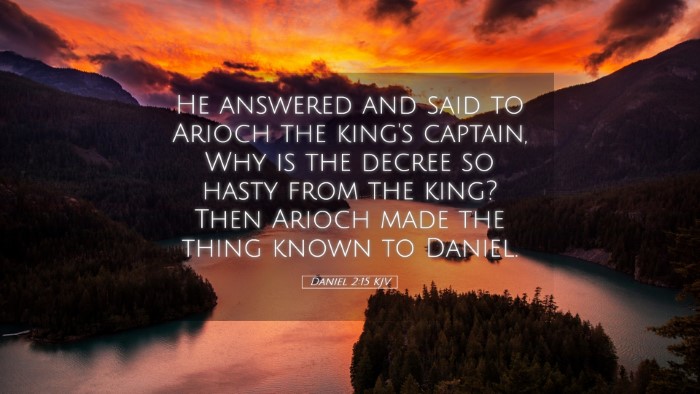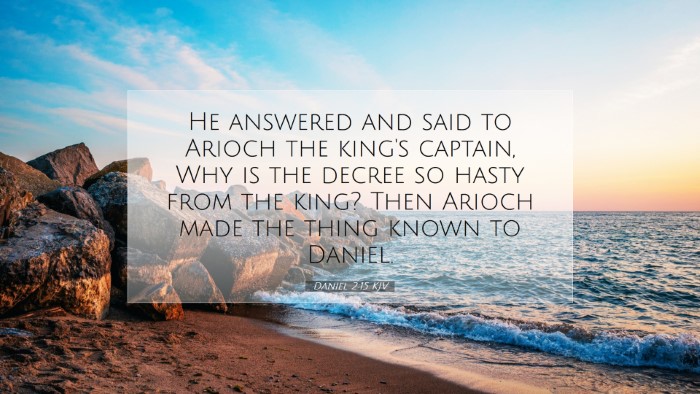Commentary on Daniel 2:15
Verse Text: "He answered and said to Arioch the king's captain, 'Why is the decree so urgent from the king?' Then Arioch made the decision known to Daniel."
Introduction
The book of Daniel serves as both a narrative and a prophecy, detailing the life of Daniel and the visions given to him during the Babylonian exile. Daniel 2 is pivotal as it introduces themes of divine sovereignty, human authority, and the relationship between God and nations. In verse 15, we find a critical moment where Daniel engages with Arioch, the king's captain, highlighting his reasoned approach to the king’s decree regarding the wise men of Babylon.
Contextual Analysis
This verse occurs in the context of a troubling dream experienced by King Nebuchadnezzar, which none of the wise men could interpret. Anger-stricken, the king orders the execution of all wise men, including Daniel and his companions. Daniel’s inquiry into the urgency of the decree provides insight into his character—marked by wisdom, composure, and a desire to understand the unfolding situation.
Insights from Matthew Henry
Matthew Henry emphasizes that Daniel’s question reveals his desire for knowledge and his proactive nature. He did not simply accept the decree of death but sought explanations to understand the gravity of the situation. This act of inquiry is significant for leaders and scholars alike, encouraging an attitude of seeking clarity amidst crises.
Insights from Albert Barnes
Albert Barnes notes that Daniel’s engagement with Arioch illustrates the importance of dialogue and communication in leadership. His question is not merely about his own fate; rather, he shows concern for the broader implications of the king's decree. This scenario underlines the interaction between divine providence and human governance, a recurring theme in the book of Daniel.
Insights from Adam Clarke
Adam Clarke points out that Daniel’s approach contrasts with that of Nebuchadnezzar, who reacts in anger. Instead, Daniel seeks to understand the reasons behind the king’s haste. This indicates a level of wisdom and restraint that is vital for those in positions of authority or those teaching others. Clarke also highlights how Daniel’s demeanor reflects a deep sense of trust in God’s plan, which is essential for facing life's uncertainties.
Theological Implications
This passage carries substantial theological weight, particularly in its portrayal of God’s sovereignty over earthly kingdoms. Daniel's immediate questioning of the decree can be seen as an act of faith, embodying the belief that God is in control—even in the face of death. It raises important discussions regarding the nature of divine revelation, the role of human agency, and how these themes weave together throughout scripture.
Faith in Action
For pastors and theologians, Daniel's interaction serves as a model of faithful action in the face of adversity. Instead of surrendering to fear or despair, he seeks understanding, reflecting a proactive faith in God’s unfolding purpose. This encourages believers to respond to life's challenges with thoughtful inquiry instead of mere resignation.
Application for Contemporary Readers
Modern readers, especially students of theology, are invited to reflect on how they approach difficult situations. Are they quick to seek understanding and clarity? Are they willing to engage with those in authority, as Daniel did? The narrative encourages a spirit of humility and a commitment to discernment, traits that are essential in discipleship today.
Conclusion
In summary, Daniel 2:15 encapsulates critical elements of biblical wisdom literature. It highlights the necessity of inquiry, the significance of dialogue, and the overarching theme of God’s sovereignty amidst human affairs. As such, it invites deep reflection among pastors, students, theologians, and scholars on how to navigate the complexities of faith, knowledge, and leadership in their own contexts.


